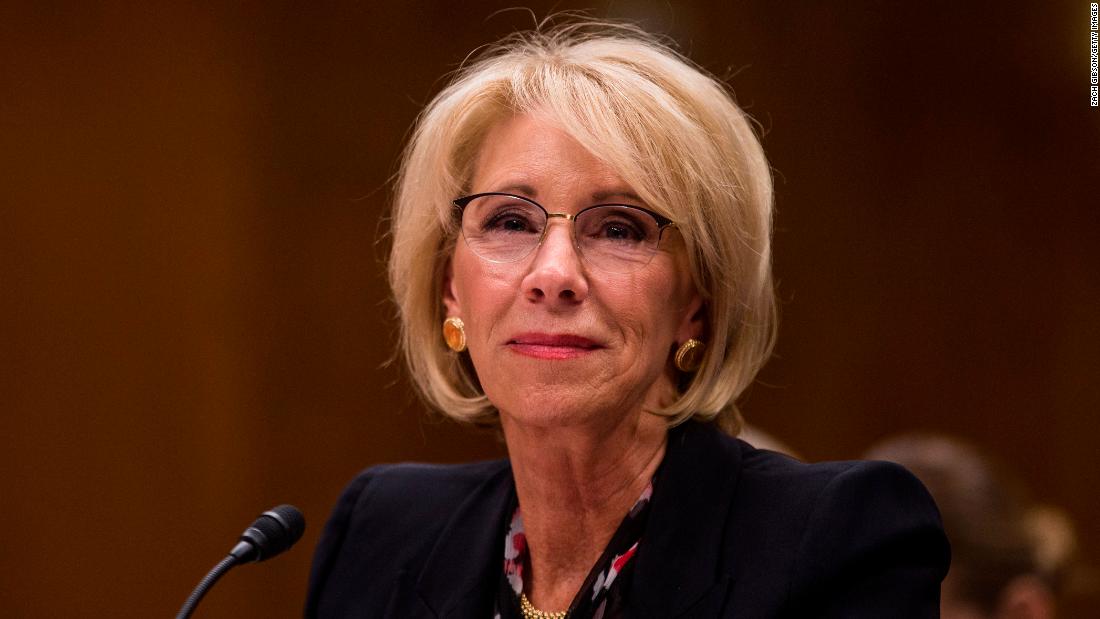[ad_1]
Illinois Democratic Sen. Dick Durbin raised the issue at a budget hearing, saying that if DeVos hadn’t come up with the cut, the person who did should get “a Special Olympic gold medal for insensitivity.”
“I love Special Olympics myself, I have given a portion of my salary to Special Olympics. I hope all of this debate encourages lots of private contributions to Special Olympics,” DeVos said Thursday.
She continued, “Let’s not use disabled children in a twisted way for your political narrative. That is just disgusting and it’s shameful, and I think we should move on from that.”
Durbin fired back: “Well Madam Secretary, let me tell you, eliminating $18 million from a $70 or $80 billion budget, I think is shameful, too. I am not twisting it.”
The cut to the Special Olympics is just a proposal and unlikely to be adopted by Congress.
Late Thursday afternoon, President Donald Trump disavowed the cuts, saying he had “overridden” DeVos’ plans to the contrary.
“The Special Olympics will be funded. I just told my people, I want to fund the Special Olympics and I just authorized a funding of the Special Olympics,” Trump told reporters at the White House before departing for a rally in Michigan.
He continued, “I’ve been to the Special Olympics. I think it’s incredible and I just authorized a funding. I heard about it this morning. I have overridden my people. We’re funding the Special Olympics.”
Shortly after Trump’s comments, DeVos issued a statement saying that she and the President agree.
“I am pleased and grateful the President and I see eye-to-eye on this issue and that he has decided to fund our Special Olympics grant. This is funding I have fought for behind the scenes over the last several years,” DeVos said.
However, DeVos has proposed the elimination twice before and lawmakers have rejected it, appropriating $17.6 million for the Special Olympics last year as part of an overall funding increase for the department.
The secretary has pointed to the fact that she’s requesting $13.2 billion for grants to states under the department’s Individuals with Disabilities Education Act and another $225.6 million for teacher preparation, research and technical assistance to support children with disabilities. These requests would maintain level funding for the department’s core special education programs.
Overall, DeVos’ proposed budget would eliminate 29 programs for an annual savings of $6.7 billion. Some are duplicative, have achieved their original purpose, are narrowly focused, or unable to demonstrate their effectiveness, according to a department budget document.
“I also acknowledge that it’s easier to keep spending, to keep saying yes, and to keep saddling tomorrow’s generations with today’s growing debts,” she said.
About 140,000 people have applications pending. Many have been waiting for years as DeVos fought to block the Obama-era rule from going into effect. She wants to rewrite it to ensure taxpayers aren’t paying to cancel loans for students who weren’t actually harmed by their colleges.
But a court ordered the department to implement the rule, known as “borrower defense,” in October. People can apply if they believe their school inflated job placement numbers, for example, or misled them about a program’s accreditation.
“There’s nothing stopping you from providing full relief to struggling borrowers today. Surely there must be some of those borrowers who you feel deserve a full discharge,” said Washington Democratic Sen. Patty Murray.
When the senator asked DeVos how many claims had been processed since the court order, the secretary said she did not know — though she said that the department is “reviewing them regularly.”
Murray, who has previously asked for the number in writing, was not satisfied with that response.
“It appears to me we haven’t moved forward at all on this and that’s not fair to the students or their families or their future,” Murray said.
When asked by Oregon Democratic Sen. Jeff Merkley what she is doing to hold loan servicers accountable to improve the process, DeVos blamed Congress for making it difficult for students to qualify.
“The rules that you set up, the legislation you passed, make it difficult,” the secretary said.
Students must have a certain kind of federal loan, work in the public sector, and pay for 10 years before qualifying for loan forgiveness.
Merkley disagreed that the law was totally to blame, calling DeVos’ response “unsatisfactory.”
“It appears that what’s going on is that you are working in partnership with these for-profit servicers rather than fighting for these public servants who were promised forgiveness,” he added.
CNN’s Betsy Klein contributed to this report.
[ad_2]
Source link



